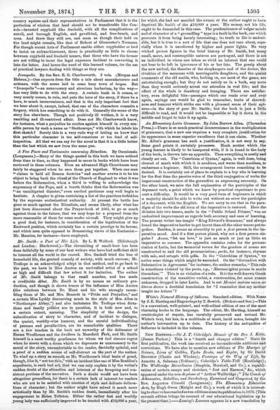An Elementary Latin Grammar. By John Barrow Allen. (Clarendon Press.)—There
is so much practical inconvenience in the multiplication of grammars, that a new one requires a very complete justification for its appearance in some superior excellence that it can claim. Whether Mr. Allen's gramma]; has such a justification, it is not easy to say. Some good points it certainly possesses. Much matter which the young learner is likely to be hampered with, if it is found in the body of the book, is thrown into an appendix. Then everything is neatly and clearly set oat The "Catechism of Syntax," again, is well done, being cleared of much with which it is needless, and worse than needless, to embarrass a beginner. Still, the arrangement leaves something to be desired. It is certainly out of place to explain to a boy who is learning for the first time the passive voice of the third conjugation of verbs the impersonal construction of the gerundive as expressing necessity. On the other hand, we miss the full explanation of the participles of the deponent verb, a point which we know by practical experience to pre- sent a difficulty. It would be a very good form of beginners in which a majority should be able to write out without an error the participles of a deponent, with the English. We are sorry to see that in the para- digm of the verbs the old form of the imperative is restored. Hero the division into two tenses, made in the "Public School Primer," was an undoubted improvement as regards both accuracy and ease of learning. The present writer has taught "King Edward's Grammar," and always found the imperative harder to get learnt than all the other tenses put to- gether. Besides, it seems an absurdity to put a first person in the im- perative mood. And if a first person plural, why not a first person sin- gular? Amen; "let me love," is just as much or putt tte little an imperative as antenna. The appendix contains rules for the pronun- ciation of Latin, but the memorial verses for the genders of nouns are constructed to snit the old pronunciation ; peas, for instance, rhymes with tads, and antigen with spies. In the "Catechism of Syntax," we notice some things which might be amended. On the "Gerundive with Substantive in Agreement," for instanoe, the author remarks," This rule is sometimes violated by the poets, e.g., ZEternas igitur pomas in morte timendum.'" This is no violation of a rule. It is the well-known Greek construction of the transitive verbal, a construction, for some reason unknown, dropped in later Latin. And is not Memini matrem meam me literas docere a doubtful translation for "I remember that my mother taught me letters"?






































 Previous page
Previous page